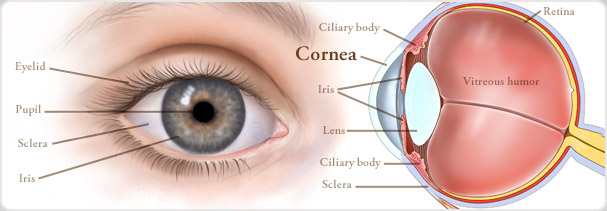What is the cornea?
Think of the cornea as the eye’s “windshield.” A healthy cornea plays an important role for the majority of our vision. When the cornea is diseased or injured it can result in poor vision and sometimes even blindness.
Most people know of a few ways to protect their vision and eye health: the use of sunglasses, not touching their eyes, and getting in the habit of wearing protective eyewear for certain professions or hobbies. However, there are many corneal conditions that can adversely affect the eyes.
Compared to other parts of the human body, the cornea is unique because there are no blood vessels. Instead, the cornea is replenished by different types of tear production within the eyeball. In order to see properly, the cornea must be free of any cloudiness.
Below are just a few diseases and disorders that can adversely affect the cornea:
Keratoconus: Keratoconus is a vision disorder that occurs when the normally round cornea (the eye’s windshield) is shaped more like a football than a basketball. This abnormality results in distorted vision. Early on, keratoconus leads to blurry, distorted eyesight and light sensitivity. These symptoms usually appear in the late teens or early 20s.
HSV Keratitis: The most common and infectious cause of corneal blindness is due to the herpes simplex virus (HSV) keratitis. Fortunately however, the outcome is usually favorable with aggressive treatment. Signs and symptoms include: discomfort, light sensitivity, irregular vision, tearing and redness. This virus is incurable, and once it is in the body, you cannot get rid of it. However, it is manageable with treatment.
Fuchs’ Dystrophy: This disease typically affects both eyes and gradually destroys eyesight as a result of severe swelling and clouding of the cornea. As the disorder progresses, swelling of the cornea can cause blisters on the front of the cornea known as epithelial bullae. This condition is known as bullous keratopathy. There is no known prevention for Fuchs’ Dystrophy. Fuchs’ Dystrophy can have a genetic cause, but it also can occur without a previous family history of the disease. In many cases, the cause is unknown. Symptoms include: light sensitivity and pain, irregular vision, halos, poor night vision and a foreign body sensation.
The vision care providers at Wiles Eye Center offer patients a multitude of eye care services and treatment options. We perform extensive consultations with our patients in order to evaluate overall eye health, refractive errors and suggest the most effective treatment plans. This thoughtful approach allows Wiles Eye Center’s vision care specialists to consistently deliver highly-rewarding treatment results for our Kansas City and St. Joseph patients.


Comments are closed here.